Herbal Healers II
Herbal Healers II
Asthisamharaka
Scientific name : Cissus quadrangularis
Family : Vitaceae
Vernacular name
- Assamese : Harjara
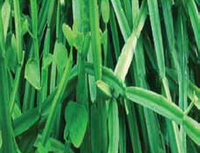
- Bengali : Hadajora
- English : Eldt grape, devilʼs backbone, adamant creeper
- Gujarati : Hadasankala
- Hindi: Hadjod
- Kannada: Mangaraballi
- Malayalam: Changalam Parande
- Marati: Kandvel
- Oriya: Hadbhanga
- Punjabi: Haddjor
- Tamil: Perandai
- Telugu: Nalleru
- Urdu : Hathjod
Medicinal Uses
- Fracture: The stem of asthisamharaka is used to bandage the part of fracture.The oil prepared from juice of this plant and gingerly oil (1:4 Plant Juice : Gingerly Oil) is externally applied over fractured part. The dried root powder can be given in dose of 1-3 gm twice daily and this can also be applied externally after mixing with hot water for bone fracture.
- Irregular menstruation: 15-20ml of asthisamharaka stem and leaves juice along with honey twice daily for 3 months is beneficial for irregular menstruation.
- Earache: Heating the stem in little flame, extracting the juice and using it as ear drops. Instillation of 2-3 drops can be cured earache.
- Bone fractures: The dried root powder of asthisamharaka can be given in dose of 1-3 gm twice daily and this can also be applied externally after mixing with hot water for bone fracture.
- Indigestion :Equal quantity of asthisamharaka leaves, dry ginger, black pepper are made into fine powder and mixed together. 5gms of this powder should be given along with warm water twice daily before food to treat indigestion.
- Joint pains: Asthisamharaka stem is fried in ghee and administered in dose of 10-15 gms with milk for the treatment of fractures and also osteo arthritis.
Aswagandha
Scientific name : Withania somnifera
Family : Solanaceae
Vernacular name
- Assamese : Ashwagandha
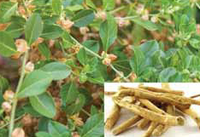
- Bengali : Ashvagandha
- English : Indian ginseng, Winter Cherry
- Gujrati : Asgandha
- Hindi : Asgandh
- Kannada : Angarberu, Hiremaddina-gida
- Kashmiri: Asagandh
- Malayalam : Amukkuram
- Marathi : Asagandha, Askagandha
- Oriya : Aswagandha
- Punjabi : Asgandh
- Tamil : Amukkaramkizangu
- Telugu: Pennerugadda
- Urdu : Asgand
Medicinal Uses
- Rejuvenation: 5gms Ashwagandha powder is cooked with 200 ml of milk till it reduced to 100ml. This is filtered and consumed when it is lukewarm. This promotes the vigor and is an established rejuvenator.
- Geriatric tiredness : Equal quantity of fine powders of Ashwagandha, Kapikacchu and black sesame seeds are mixed thoroughly. It is administered in a dose of 5 grams, with a cup of warm milk is useful to relieve tiredness, fatigue and geriatric problems such as arthritis.
- Allergic rhinitis: Equal quantity of Turmeric, Ginger and Ashwagandha powders are mixed well. 5 grams of this powder is consumed twice daily with milk before food to relieve allergic rhinitis.
- Oligospermia: Regular intake of 5 grams of Ashwagandha root powder mixed with honey and ghee twice daily is helpful to relieve the senile debility and seminal disorders especially oligospermia.
- Insomnia: 5gms of Ashwagandha root powder mixed in a cup of milk with sugar bed time regularly is beneficial in case of insomnia.
Asvattha
Scientific name: Ficus religiosa
Family : Moraceae
Vernacular name
- Assamese: Ahant
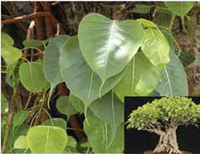
- Bengali : Asvattha, Ashud, Ashvattha
- English: Pipal tree
- Gujrati : Piplo, Jari, Piparo, Pipalo
- Hindi : Pipala, Pipal
- Kannada : Arlo, Ranji, Basri, Ashvatthanara, Ashwatha, Aralimara, Aralegida, Ashvathamara, Basari, Ashvattha
- Kashmiri : Bad
- Malayalam : Arayal
- Marathi : Pipal, Pimpal, Pippal
- Oriya : Aswatha
- Punjabi : Pipal, Pippal
- Tamil : Ashwarthan, Arasamaram, Arasan, Arasu, Arara
- Telugu : Ravichettu
Medicinal Uses
- Wound: 50 gram of peepal stem bark is boiled in 400 ml water till it reduces to 100 ml. This lukewarm decoction is used to wash the wounds .This is helpful in infected as well as non infected wounds and it facilitates quick healing. The root bark fine powder of Asvattha is used for dusting over the oozing skin lesions to stop secretion.
- Mouth ulcer: 5-6 tender shoots paste of Asvattha is retained in the mouth and chewing for 5-10 minutes is helps to relieve stomatitis.
- Hyper Pigmentation: Early morning fresh latex of Asvattha is collected and is applied over the skin lesions.This relieves hyper pigmentation as well as discoloration of the face.
- Leucorrhoea: 2 ml of fresh latex is added to 100ml of milk and taken early in the morning in empty stomach. This pacifies long persisting non specific leucorrhoea by 20-30 days medication.
- Colic: Internal administration of 50ml decoction of root bark of Asvatta (10gms of bark powder is boiled in 200ml of water till it reduced to 50ml) added with salt and jaggery twice daily, alleviates severe colic.
Atasi
Scientific name : Linum usitatissimum
Family : Linaceae
Vernacular name
- Assamese : Tisi, Tusi
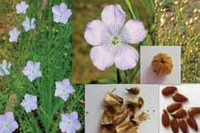
- Bengali : Masina, Atasi
- English : Linseed
- Gujrati : Alshi, Arasi
- Hindi : Alsi
- Kannada : Agasebeeja, Semeagare, Agasi
- Kashmiri : Alsi
- Malayalam : Agastha, Agasi, Cheru charm
- Marathi : Atshi
- Oriya : Atushi
- Punjabi : Ali
- Tamil : Ali, Virai
- Telugu : Avisa
- Urdu : Alsi, Katan
Medicinal Uses
- Dysuria: 5gms of Atasi seeds are soaked in a 100ml of hot water for overnight. Next day morning, it is macerated well and filtered. This is consumed before food for the treatment of burning urination.
- Dyslipidaemia: Early in the morning 2-3 ml linseed oil is added to a cup of warm water and taken in empty stomach. This helps to reduce the total cholesterol, and also beneficial in obesity.
- Lactation: Equal quantity of Linseed, cumin seeds and fenugreek seeds are made into fine powder . This mixer is taken twice a day in the dose of 5 gram along with milk. This improves lactation.
- Wasp sting: Fresh, mature flax leaves are crushed to obtain fresh juice. In case of emergency, as a first aid this juice is applied over the wasp sting area. This quickly relieves burning sensation and pain.
- Throat pain: Fine paste of 2‒3 fresh flowers of atasi is applied around the throat. This pacifies throat pain.
- Arthritis: One fist full of seeds are soaked in sour buttermilk through out the night. Next day morning, made into fine paste and applied over the joints. This relieves joint pain by one or two weeks.
Atmagupta (Kapikacchu)
Scientific name : Mucuna prurita
Family : Fabaceae
Vernacular name
- Assam : Banar Kakua
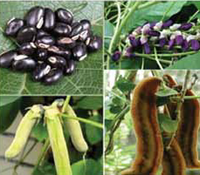
- English :Cowhage
- Gujarati : Kavach, Kaucha
- Hindi : Kewanch, Kaunch
- Kannada : Nasugunne, Nasugunnee
- Malayalam : Naikuruna
- Marati :Khajkuhilee, Kavach
- Oriya : Baikhujnee
- Punjabi :Tatgajuli, Kawach
- Tamil : Poonaikkali
- Telugu : Doolagondi, Duradagondi
- Urdu : Kanwach, Konch
Medicinal Uses
- Venereal Diseases: Internal administration of 3gms of atmagupta seed powder boiled in 100 ml of cowʼs milk with sufficient sugar twice daily to cure venereal diseases.
- Sciatica: 5gms of atmagupta root powder boiled in 200 ml of water and reduced it into 50ml. Drinking this filtered decoction twice daily for a month in Sciatica .
- Dysuria: Atmagupta (Kapikacchu), Shatavari and Gokshura powders are taken equal quantity. 10 gms of this mixture boiled in 200ml of water and reduced to 50 ml. Oral intake of this decoction twice daily beneficial in dysuria
- Kampavata (Parkinson's disease):5gms of Kapikacchu churnam cooked in milk for 5-10 min in low flame. Take this milk by adding sugar and one teaspoon Ghee twice a day to cure Parkinsonism and Male Infertility.
- Filarial swelling (Sleepada): Regular application of atmagupta root paste externally over the affected region will reduce the swelling.
Avartani
Scientific name : Helicteres isora
Family : Sterculiaceae
Vernacular name
- English : Indian screw tree
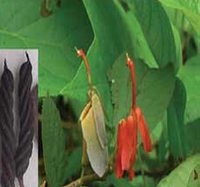
- Hindi : Marod phali
- Tamil : Valipiri
- Telugu : Nunidala guba tasa, guvardara
- Gujarati : Maradasing
- Urdu : Murmuriya
- Malayalam : Isvaramuri
- Bangali : Antmora
- Kannada : Peda mur
Medicinal Uses
- Earache: The crushed pods of avartani added with gingerly oil and boiled . The prepared oil is used as ear drops(2 ‒ 3 drops) for pricking pain in ears and other ear ailments.
- Hiccup:4 ‒ 6 grams of avartani pod powder with honey 2 times a day is useful in cases of hiccup, fever etc.
- Diarrhea: 5 gms of crushed bark & pod of avartani is boiled in 100ml of water and reduced to 25ml. This decoction is given for diarrhea twice or thrice daily.
- Eczema: External application of the Leaves Paste is effective for various skin ailments like scabies, eczema etc.
- Colic: 3-6grams of fruit powder of avartani with warm water twice daily is useful in colic. The fruits give an imagination about intestines. The fruits are twisted, hence they are useful in twitching pain of abdomen.
- Scabies: The root paste is applied topically for Scabies.
Bhringaraja
Scientific name : Eclipta alba
Family : Asteraceae
Vernacular name
- Assamese : Bhrngaraja
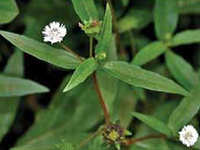
- Bengali : Bheemraja, Kesuriya, Kesari
- English :Trailing Eclipta, Thistles, False Daisy
- Gujrati :Bhangaro, Bhangro
- Hindi :Bhangara, Bhangaraiya
- Kannada : Garujalu, Gurugada, Soppu, Keshavardhana, Kodigaraju
- Malayalam : Kayyonni, Knnunni
- Marathi : Bhangra, Bhringiraja, Maka
- Punjabi : Bhangra
- Tamil : Karisalankanni, Karisalanganni, Karisalai
- Telugu : Guntakalagara, Guntagalagara
- Urdu : Bhangra
Medicinal Uses
- Throat irritation: 5 grams of dried bhringaraja powder is mixed with honey and licked. This is effective in the treatment of cold, cough, throat irritation, anaemia, asthma etc.
- Liver disorders: Fresh juice bringaraja 10‒15 ml is taken early in the morning preferably in the empty stomach for 7-12 days helps significantly in the treatment of liver disorders and obstructive jaundice.
- Male infertility:3 grams seeds or seed powder is soaked in sugar water for half an hour and taken daily in the morning and evening. This helps to improve the sexual vigour and promotes the sperm count.
- Chronic skin diseases: Daily intake of 5gms of bringaraj in one cup of water and made this decoction is consumed twice daily. This has good benefit over the steroid resistant skin diseases and in psoriasis.
- Hair care: 25 gram of Bhringaraja paste, 100 ml of sesame or coconut oil and 400 ml Bhringaraja decoction or 200 ml of fresh juice are taken and oil is cooked. This is effective in dandruff, hair fall and premature greying of hair.
- Rejuvenation: Intake of powder of bringaraja leaves, black sesamum, amalaki and sugar in equal quantity acts as a Rasayana. (Immuno modulator).
Bhumyamlaki
Scientific name : Phyllanthus niruri
Family : Euphorbiaceae
Vernacular name
- Assamese : Bhuin Amla
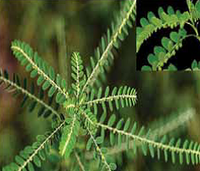
- Bengali : Bhumamla, Bhumi amalaki
- English : Country gooseberry
- Gujrati : Bhoi Amali, Bhony amari, Bhonyamali
- Hindi : Jangliamli, Hazardana, Jaramala, Bhui amla
- Kannada : Nelanelli
- Kashmiri : Kath
- Malayalam : Kizanelli, Keezhanelli, Ajjhada
- Marathi : Bhuiawali
- Oriya : Bhuin Amla
- Punjabi : Lodhar
- Tamil : Kizhukai nelli, Kizanelli
- Telugu : Nela usirika
- Jaundice: The juice of whole plant of bhumyamlaki is given in the dose of 10-20ml three times daily. It cures inflammation of the liver. The extract of the whole plant is used to cure Hepatitis A, Hepatitis B, and Hepatitis C.
- Leucorrhoea: The juice of whole plant of bhumyamlaki in the dose of 20-30ml in early morning should be administered once daily in case of leucorrhoa, menorrhagia, and other urinary disorders.
- Diabetes: 10gms of whole plant of bhumyamlaki paste boiled in 100 ml of water till it reduced to 25ml. Administration of this decoction orally twice a day is very effective in diabetes.
- Mouth Ulcers: The decoction prepared from leaves and roots of bhumyamlaki is used for gargling for aphthous ulcers.
- Renal calculi: Regular intake of 20ml of bhumyamlaki whole plant juice daily once is very effective in breaking the stones.
- Wound: The whole plant paste of bhumyamlaki prepared along with rice gruel should be applied locally for healing of ulcers and wounds.
Bibhitaka
Scientific name : Terminalia belerica
Family : Combretaceae
Vernacular name
- Assamese : Bhomora, Bhomra, Bhaira
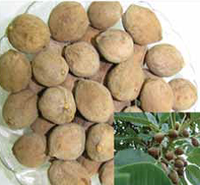
- Bengali : Bayada, Baheda
- English : Beleric Myrobalan
- Gujrati : Bahedan
- Hindi : Bahera
- Kannada : Tare kai, Shanti Kayi
- Kashmiri : Babelo, Balali
- Malayalam : Tannikka
- Marathi : Baheda
- Oriya : Baheda
- Punjabi : Bahera
- Tamil : Thanrikkai
- Telugu : Thanikkaya
- Urdu : Bahera
Medicines Uses
- Mouth ulcers: 10 gms coarse powder of Bibhitaka stem bark in one cup of water made a decoction is used for gargling in case of mouth ulcers.
- Bleeding wound: The fruit rind is made into fine paste and applied over the bleeding spots. This helps to arrest bleeding in wound instantly.
- Grey hair: The seed marrow into fine paste 50 gram, 200 ml sesame oil is added and exposure to sunshine for 10-12 days. Later it is filtered and stored in glass bottle. This oil is applied to the base of the scalp in case of premature graying of hairs .
- Cough: 10gms vibithaki powder with honey taken after meals alleviates cough and dyspnoea.
- Urinary calculus: 5gms of seed powder of bibhitaki taken with cup of radish juice removes defects of urine and eliminates calculus.
Bilva
Scientific name : Aegle marmelos
Family : Rutaceae
Vernacular name
- Assamese : Bael, Vael
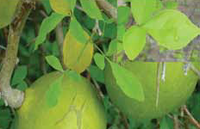
- Bengali : Bela, Bilva
- English : Bengal Quince, Bael fruit
- Gujrati : Bill, Bilum, Bilvaphal
- Hindi : Bela, Sriphal, Bel
- Kannada : Bilva
- Kashmiri : Bel
- Malayalam : Koovalam
- Marathi : Bel, Baela
- Oriya : Bela
- Punjabi : Bil
- Tamil : Vilvam
- Telugu : Maredu
- Urdu : Bel
Medicinal Uses
- Prameha(Diabetes): Take 15ml of leaf juice once in a day before food to manage diabetes and reduce excess urination.
- Intestinal worms: 5 grams of dried and powdered pulp of the bilva fruit with butter milk should be administered twice a day for one week for elimination of intestinal worms
- Piles: Crush an unripe bilva fruit, 3gms of dried ginger and 3gms of fennel soak this mixture in 200ml of Hot water over night. Consume this water in dose of 50ml 3 to 4 times a day to heal piles.
- Constipation: Intake of 5gms of bilva fruit pulp mixed in a glass of butter milk or warm water twice a day to get relief from irritable bowel syndrome, constipation and indigestion.
- Chronic diarrhea: Dry the slices of an unripe bilva fruit in sun and grind them into powder. intake of 5gms of this powder along with warm water 2 times a day is useful.
- Jaundice: Administration of 3gms of black pepper in a 15ml of bilva leaves juice followed by butter milk twice or thrice a day in beneficial in Jaundice.
- Mouth ulcers: Consume the mixture of a 20ml of bilva fruit pulp and a teaspoon of sugar in the morning on an empty stomach for 3 days. It heals stomach and mouth ulcers.
Last Modified : 3/2/2020
Provides information about health benefits of Bael...
